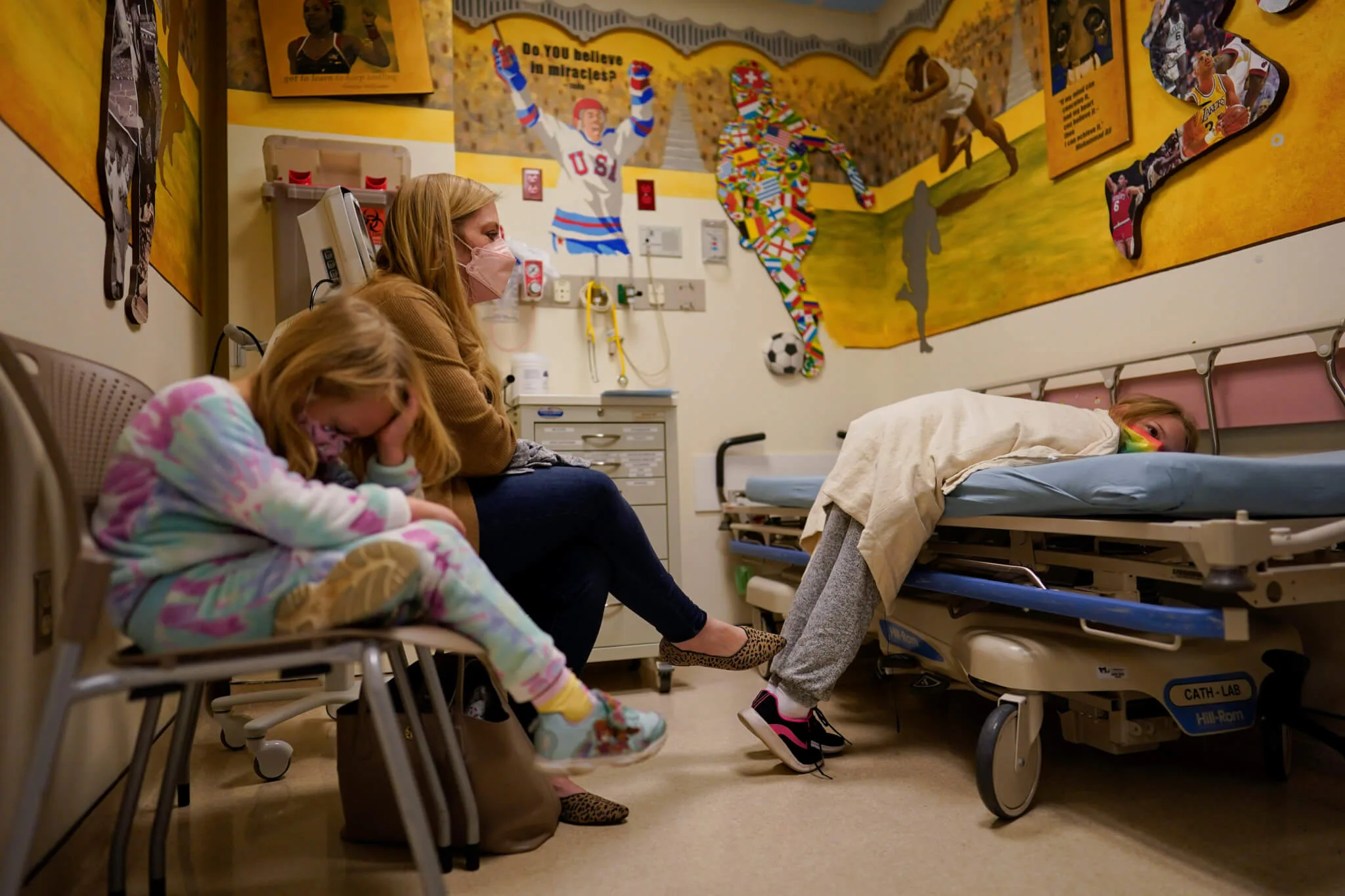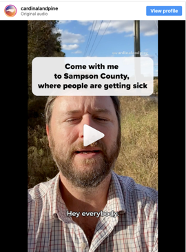
Lexie Stroiney, 6, left, Charlie Stroiney, 8, right, and their mom Kate Forte await the results of COVID tests in January at Children's National Hospital, in Washington. (AP Photo/Carolyn Kaster)
The COVID-19 crisis has also sent anxiety and depression rates soaring nationwide, increased deaths from opioids and alcoholism, and scarred a generation of children.
COVID has killed 23,174 people in North Carolina, but the damage doesn’t stop there.
The pandemic has also sent anxiety and depression rates soaring nationwide, increased deaths from opioids and alcoholism, and forever scarred a generation of children who’ve seen severe setbacks at school or lost a caregiver to COVID. That is not to mention the large numbers of people experiencing long-COVID or related illnesses.
Even mild COVID infections, for example. have been linked to a significantly greater chance of developing diabetes, cognitive decline, and heart disease in previously healthy people.
It’s COVID’s extensive collateral damage, and the world is caught between our wounded mental health and the very real, continuing dangers of a virus that’s not as ready to quit as we are.
Here is a look at these offshoot calamities and what can be done about them.
Mental Health
According to an analysis of national data by the science journal Nature, more than 42% of people in the US reported symptoms of anxiety or depression in December, an increase from 11% the previous year.
North Carolina has devoted resources to its Hope4NC Helpline (1-855-587-3463), which offers phone, text and online chat services 24 hours a day, seven days a week. The North Carolina hip-hop singer Rapsody recorded a video for the line, urging people to use it to get the help they need.
“The COVID-19 pandemic has been a traumatic experience for so many people,” Rapsody said. “Healing is without a doubt a process, a process that you don’t have to go through alone. And I need you to know it’s ok not to be ok.”
And this summer, the federal officials will introduce a 911-equivalent direct dial for the National Suicide Prevention Lifeline. By calling 988, anyone in the US will be able to reach the line and speak to qualified professionals who can direct them to immediate and appropriate care.
Until then, here is a link to the other resources in North Carolina to address mental health concerns, whether emergencies or long-term challenges.
Opioids and Alcohol
In 2020, the number of opioid deaths climbed by 20% over the previous year. That’s nine deaths a day.
“Stress, loss of housing and loss of employment for those in recovery caused by the COVID-19 pandemic has led to a backslide in our fight against substance use disorders,” NCDHHS Secretary Kody H. Kinsley said in a news release last week.
But there is some help on the way.
North Carolina was part of a lawsuit settlement that will soon bring in $750 million from the drug companies responsible for the opioid epidemic. The funds will go primarily to local communities throughout the state to pay for “treatment, recovery, prevention, and harm reduction services.”
Opioids — highly addictive pain-reducing drugs that range from prescription Oxycodone to heroin — have killed nearly 30,000 North Carolinians since 1999.
Local communities will start receiving the money on April 2, and the NCDHHS built a dashboard where you can track the schedule and amounts dispersed to each county or municipality.
The first year of the pandemic brought with it a similar increase in alcohol-related deaths, especially in people ages 24- 44, and for parents with young children at home. As with the opioid deaths, the COVID shutdowns made it far more difficult for people to seek treatment for drug and alcohol abuse.
Here is a list of alcohol treatment resources and facilities.
Children’s “Hidden Pain”
Some 3,600 children in the state, most of them children of color, lost a parent or caregiver to COVID.
“The Biden administration has directed some pandemic relief aid to student mental health programs and some states passed related legislation, but none of the efforts have focused solely on children who have lost caregivers,” Pew, the non-profit research group, has reported.
Mental health groups are pressing at the national and state level for legislation that will tackle this problem head on, Pew wrote, especially in rural areas.
“As we move forward through this pandemic, I don’t want people to feel as though, if the pandemic is getting better, then the youth mental health issue will go away,” Dr. Christine Crawford, associate medical director of the National Alliance on Mental Illness, a national mental health advocacy organization, told Pew. “The reality is that that’s not the case, because this crisis pre-existed COVID. And it’s even more dire in these rural areas because there is hardly any mental health support in place.”
Support Our Cause
Thank you for taking the time to read our work. Before you go, we hope you'll consider supporting our values-driven journalism, which has always strived to make clear what's really at stake for North Carolinians and our future.
Since day one, our goal here at Cardinal & Pine has always been to empower people across the state with fact-based news and information. We believe that when people are armed with knowledge about what's happening in their local, state, and federal governments—including who is working on their behalf and who is actively trying to block efforts aimed at improving the daily lives of North Carolina families—they will be inspired to become civically engaged.


Op-Ed: Studying the Holocaust remains vital to ensuring it never happens again
International Holocaust Day will be observed on January 27, 2024. This day commemorates the liberation of the Auschwitz concentration camp by the...

VIDEO: How Rural Broadband Is Coming to This North Carolina County
More than 1.1 million North Carolinians lack access to high-speed internet, a necessity of the modern economy. In Warren County, help is on the way,...

VIDEO: Sampson County puts Biden’s promise to boost rural infrastructure to the test
Locals in this rural NC county say their water and air is polluted by a PFAS-contaminated landfill, massive hog and poultry farms, and industrial...

VIDEO: Sampson County puts Biden’s promise to boost rural infrastructure to the test
Locals in this rural NC county say their water and air is polluted by a PFAS-contaminated landfill, massive hog and poultry farms, and industrial...

Mold and classes in trailers: Inadequate funding for schools is hurting NC communities
Schools across the state are dealing with dilapidated classrooms and buildings in need of significant repair or a total rebuild due to a lack of...








